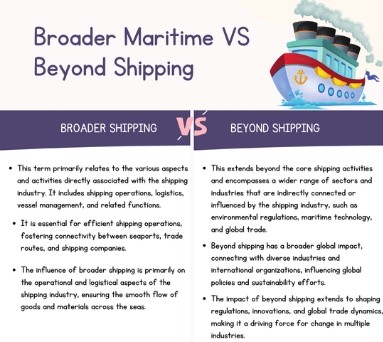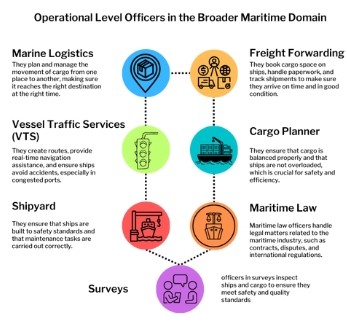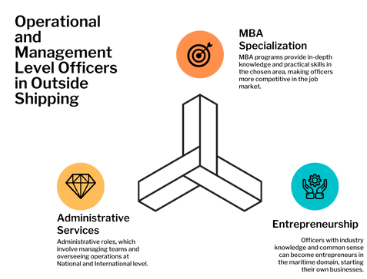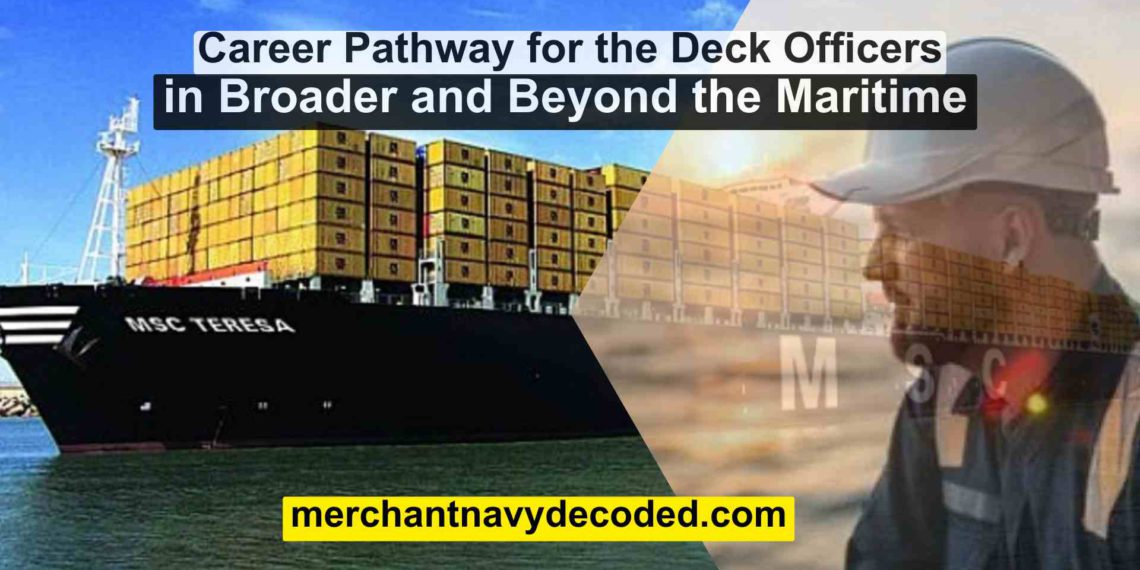Career Pathway for the Deck Officers in Broader and Beyond the Maritime
Overview:
- Explore Beyond Shipping: Discover a world of maritime career options beyond traditional shipping companies.
- Defining the Scope: Delve into the ideas of what broader maritime and beyond shipping means.
- Diverse Pathways: From marine logistics to entrepreneurship uncover a multitude of opportunities in the broader maritime domain.
Defining the Scope: Broader Maritime and Beyond Shipping

Broader Maritime:
- When we talk about the “broader maritime,” we mean all the different kinds of jobs and opportunities within the entire world of activities related to the sea. This includes not only working on ships but also jobs connected to ports, marine logistics, shipbuilding, and more. It’s about considering a wide range of career possibilities in the maritime field, not just limited to being on a ship.
Beyond Shipping:
- “Beyond shipping” refers to exploring career paths that are completely unrelated to the business of moving goods on ships. It means looking for work in different industries or roles that don’t involve ships, cargo, or shipping companies. This might include jobs in finance, technology, education, or any field that has nothing to do with the sea or shipping. It’s about branching out and considering career options that are quite different from what you might have traditionally associated with maritime work.
Why Choose Broader and Outside Shipping As a Career After Switching Onshore?

- Variety of Experiences: Shifting onshore from a maritime career lets you explore different industries and work environments. You can gain a wider range of experiences, from corporate offices to non-maritime roles, making your career journey more diverse and interesting.
- New Learning Opportunities: Choosing a broader career outside shipping opens doors to learning new skills and knowledge. You can expand your expertise in various fields, boosting your personal and professional growth, and becoming more versatile.
- Better Work-Life Balance: Many onshore careers offer improved work-life balance compared to maritime roles that involve long stretches at sea. This shift can lead to a more stable and balanced lifestyle, allowing you to spend more time with family and pursue personal interests.
Operational Level Officers in the Broader Maritime Domain

Marine Logistics:
- Responsibilities: Operational officers in marine logistics are responsible for ensuring that goods and products are transported efficiently by ships. They plan and manage the movement of cargo from one place to another, making sure it reaches the right destination at the right time.
- Skills Needed: They need good organization skills and the ability to coordinate various aspects of the supply chain, like loading and unloading cargo, scheduling ship routes, and communicating with different teams involved in shipping.
Freight Forwarding:
- Responsibilities: Operational officers in freight forwarding help companies ship their goods globally. They book cargo space on ships, handle paperwork, and track shipments to make sure they arrive on time and in good condition.
- Skills Needed: Effective communication skills are crucial because they work with various parties, such as shippers, carriers, and customs officials. They also need analytical skills to solve problems and mathematical skills to calculate shipping costs.
Vessel Traffic Services (VTS):
- Responsibilities: VTS officers help guide ships safely through busy or challenging waterways. They create routes, provide real-time navigation assistance, and ensure ships avoid accidents, especially in congested ports.
- Skills Needed: VTS officers require a strong understanding of maritime safety and navigation. They must be quick decision-makers and excellent communicators to guide ships safely through tricky waters.
Cargo Planner:
- Responsibilities: Cargo planners, often in container shipping, determine how to best load and unload ships. They ensure that cargo is balanced properly and that ships are not overloaded, which is crucial for safety and efficiency.
- Skills Needed: These officers must be meticulous planners and coordinators. They work closely with port workers and shipping crews to manage cargo loading and unloading, so strong teamwork and communication skills are vital.
Shipyard:
- Responsibilities: Operational officers in shipyards oversee the construction, repair, and maintenance of ships. They ensure that ships are built to safety standards and that maintenance tasks are carried out correctly.
- Skills Needed: Shipyard officers require knowledge of ship design and construction, as well as the ability to manage teams and projects. Engineers play a significant role, but there are also open-deck aspects for other officers.
Maritime Law:
- Responsibilities: Maritime law officers handle legal matters related to the maritime industry, such as contracts, disputes, and international regulations. They may represent shipping companies, seafarers, or other parties in legal proceedings.
- Skills Needed: Officers pursuing a career in maritime law need to complete additional law certifications. Strong research, negotiation, and legal analysis skills are essential for success in this field.
Surveys:
- Responsibilities: Operational-level officers in surveys inspect ships and cargo to ensure they meet safety and quality standards. They may work for classification societies, insurance companies, or government agencies.
- Skills Needed: Attention to detail and an understanding of maritime regulations are key. They can advance to higher positions in maritime surveying through experience and further training.
Management Level Officers in the Broader Maritime Domain

Container Background:
- Role: Management officers with a container background often take on leadership positions in companies that specialize in container shipping. They oversee various aspects of container logistics.
- Career Path: Many CEOs in freight forwarding companies have a background in container shipping, as it provides a deep understanding of the complexities of containerized cargo and global shipping operations.
Agency Management:
- Responsibilities: Officers in agency management are in charge of ensuring a smooth turnaround for vessels at ports. They coordinate with port authorities, handle paperwork, and oversee operations.
- Critical Role: Agencies play a vital role in port operations, facilitating the arrival, departure, and efficient handling of ships and cargo. Management officers in this field are essential for smooth maritime trade.
Vessel Traffic Services (VTS) Management:
- Role: VTS management officers lead the operation of Vessel Traffic Services, which guides ships through busy or challenging waters like congested ports.
- Complexity: Managing VTS in areas with heavy traffic, such as Singapore or Shanghai ports, is complex. VTS management ensures the safe and orderly flow of maritime traffic in these critical areas.
Shipyard Management:
- Responsibilities: Officers in shipyard management oversee ship construction, repair, and maintenance. They ensure that ships are built and maintained according to safety standards.
- Crucial for Safety: Shipyard management is crucial for ship safety and quality. Managers ensure that ships are seaworthy and meet regulatory requirements.
Maritime Law:
- Role: Management officers in maritime law are legal experts who specialize in maritime-related legal matters. They handle contracts, disputes, and compliance with international maritime laws.
- Certifications Required: Pursuing a career in maritime law typically requires additional legal certifications and expertise in maritime regulations.
Surveying:
- Responsibilities: Management-level officers in surveying oversee the inspection of ships and cargo to ensure they meet safety and quality standards. They may work for classification societies, insurance companies, or government agencies.
- Career Advancement: With experience and further training, these officers can advance to higher positions in maritime surveying. Their work ensures the integrity and safety of vessels and cargo.
Operational and Management Level Officers in Outside Shipping
Nautical science, Studying nautical science focuses on sea navigation and the maritime world, which often leads to jobs related to ships and the ocean. If someone wants to work in other areas, they need a strong interest in learning new things and improving their skills. Nautical science is very specific to the sea, so people looking for different jobs must be ready to learn new things and get extra qualifications to match what those jobs need. This means working hard and always being open to learning new stuff, as they explore new opportunities away from sea.

Skill Enhancement:
- Importance: Continuous skill development is crucial for operational officers in the maritime industry. This ensures they stay up-to-date with industry changes and advancements.
- Diverse Skills: Operational officers can enhance their skills in various areas, from safety procedures and navigation to communication and problem-solving.
MBA Specialization:
- Benefit: Pursuing an MBA with a specialization, like logistics, data science, or project management, can open doors to new career opportunities.
- Skills Gained: Specialised MBA programs provide in-depth knowledge and practical skills in the chosen area, making officers more competitive in the job market.
Administrative Services:
- Transition Opportunity: Operational and Management officers can transition into administrative roles, which involve managing teams and overseeing operations at National and International levels.
- Skills Needed: Administrative roles require skills in organization, leadership, and effective communication, making it essential for officers to adapt to these responsibilities.
Entrepreneurship:
- Opportunity: Officers with industry knowledge and common sense can become entrepreneurs in the maritime domain, starting their businesses.
- Degree Not Required: Unlike some fields, entrepreneurship in the maritime industry often doesn’t require a specific degree; practical knowledge and creativity are key.

Explore Deck Officer’s Career Pathway to get a Shore Job in Core shipping
Conclusion

The world of jobs related to the sea has a lot of different options, each with its challenges and rewards. When we look at all the cool jobs in the maritime world and think about the ones that aren’t just about regular shipping, we see that it’s important to like what you do and be ready to try new things. Whether you’re working on organizing stuff for ships, starting your own business, or helping ships stay safe as a VTS officer, what you end up doing depends on the choices you make. A job that starts on the water can turn into something bigger and take you to work on land in areas like working with data, running things, or even being a lawyer.
Disclaimer :- The opinions expressed in this article belong solely to the author and may not necessarily reflect those of Merchant Navy Decoded. We cannot guarantee the accuracy of the information provided and disclaim any responsibility for it. Data and visuals used are sourced from publicly available information and may not be authenticated by any regulatory body. Reviews and comments appearing on our blogs represent the opinions of individuals and do not necessarily reflect the views of Merchant Navy Decoded. We are not responsible for any loss or damage resulting from reliance on these reviews or comments.
Reproduction, copying, sharing, or use of the article or images in any form is strictly prohibited without prior permission from both the author and Merchant Navy Decoded.



